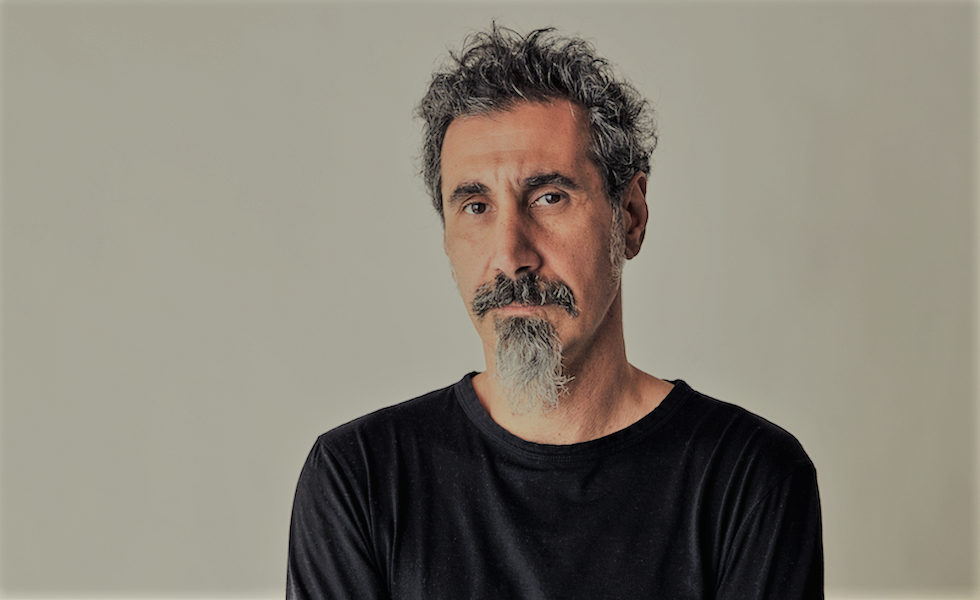For his entire career, whether it be with System of a Down or in a solo capacity, Tankian has made an art out of ascribing beautiful words to brutal things. On his brand new solo record, Elasticity, that pursuit remains undeterred, and as in demand as ever.
Elasticity is a compilation of tracks that explains, laments, and ponders atrocities carried out in his homeland Armenia, currently besieged by Azerbaijan and propped up by an uneasy mediator in Russia. In its purest form, it speaks to the past in an attempt to course-correct the future. With that in mind, it would simply be a turn of fate that Blunt Magazine would speak to Serj about Elasticity on the 106th anniversary of the Armenian Genocide in World War I.
It’s an event that’s unusually close to Australians, given that the genocide coincided with the arrival of the ANZACs in Gallipoli. Despite that fact, Australia is one of the few nations yet to officially recognise the genocide. It’s a geo-political hot potato where, surprise surprise, vested interests usurp doing the right thing. Even more fortuitous, at the time of this publication, United States President Joe Biden has confirmed that he will officially recognise the genocide, which could move the needle on the subject in Australia.
I want to use the word fun quite cautiously, but you do seem to have a certain shine about you throughout this project. You seem to be enjoying yourself creating. Was this a particularly fun project, even considering how heavy the subject matter was?
Rock music is not brain surgery, it’s quite fun. It’s something that comes naturally to me. So, when these songs came and these songs, I wrote a while back, five, six years ago, they definitely had this… Especially a song like ‘Elasticity’ or ‘Your Mom’, [they] had this humorous kind of over the top feeling to them and also a punk ethos, which is the reason why I thought they might work for System of a Down. Obviously we couldn’t make that work, so that’s fine. But it definitely had those elements to it. And it’s different times, which, you know what, I actually prefer, because it’s bringing something I’ve done for 25 years and as fun as it is, it’s diminishing creative returns.
You have such an ability to craft these heavy stories into something that’s enjoyable to listen to. How does it come out for you? How does it get out of your head like that?
It’s funny because I always write the music first, and the music predicates its own lyrical content. So, the music asks for something and if you get it wrong – I’ve done that before, like the song ‘Lie Lie Lie’ from Elect the Dead, it was a serious song at first, lyrically, and the music, it just wasn’t working out. It just wasn’t jiving. And I was like, “What’s wrong with this? Why do I feel wrong about this? The lyrics are good. Why do I feel wrong about it?” It didn’t belong. So, the music asks for its own lyrics. You have to listen to the music, you have to cater, service the music with the right lyrical ideology, philosophy, content, words.
You have to open your mind to the universe and let ideas and thoughts and visions come in to complement that music with the vibe that it’s asking for. It feels [like] more work to write lyrics than music. Music feels like more fun. Some lyrics come faster than others, but lyrics feel more like sitting down and working.
The name Elasticity, I feel as though that is one word that tells a big story. There are a lot of angles that could go down there.
The song itself was called ‘Elasticity’ because it was so elastic, it was so all over the place. I just thought it was really over the top and [it] went from really nutty-Germs-punk-rocky to kind of middle-of-the-road rock to metally stuff, then suddenly it’s beautiful. This ambient moment, that just stood out for the title. It also reminded me of Toxicity, and the System punk ethos, so it kind of just worked organically in that sense.
‘Rumi’ is named after your son and the brilliant Sufi love poet. How important was it for you to nestle in some love, some positivity, in and amongst the general subject matter of the other tracks?
It was not intentional at all. I was playing this beautiful piano melody and I was trying to get his attention and he was saying words. And then I did it as a demo, and then I’m like, “Damn, that makes sense that it’s about my son.” There’s something deep within the piano and the vibe of this song and the subject matter being him. But I also wanted to give credence to his namesake, the poet Rumi, Jalāl ad-Dīn Rumi, a 12th century Persian love poet who is the most sold love poet on the planet. And that’s the reason we named our son after him. It became a universal message of the poet Rumi to the world, and a father’s message to his son.
Armenian Remembrance Day is happening this weekend. People have a lot to care about at the moment, but I don’t think that’s an excuse to stop caring. And indeed, no one wants to stop caring. As a direct way to speak to Australians, what can we do in our little capacity, in our little corner of the world, to add more impact to the date?
I’ll make it simple. All four of my grandparents were survivors of the Armenian Genocide, with brutal stories about how their family perished. It is a historical fact, well known around the world. The only reason that there are a few Western nations, Australia, New Zealand and [the] UK, I think are the only ones left, that haven’t properly recognised this [is] because of their trade relationship with Turkey and not wanting to anger them. But imagine the Holocaust not being recognized for 106 years.
We must speak truth to history. It’s important for Australia, it’s important for the government of Scott Morrison, it’s important for the Aussie parliament to recognize the Armenian genocide, just like it is for the UK government. I was on BBC’s HARDtalk talking to Stephen Sackur saying the same thing. Same thing for Jacinda Ardern and the New Zealand parliament, it’s time to do the right thing.
What do we do after we sign the piece of paper and officially recognise the event?
That would send a definite moral message that genocide is unacceptable. But after that, it’s really trying to seek justice for the past injustices of the genocide. One and a half million Armenians, Greeks and Assyrians were slaughtered systematically by the Ottoman Turkish government in 1915 during World War I. And it started on April 24th, one day before the landing of ANZAC troops in Gallipoli. There’s a connection, Australian history, New Zealand history, shows exactly what happened to the refugees, how Aussies and Kiwi soldiers protected Armenians that were escaping the massacres and all of this stuff.
It’s all about being honest with your own history, not just world history.
For you personally as an activist, is there a mark that if you achieve that, you can go back to writing songs about partying and getting drunk?
It’s like I’ve always written songs about partying! Yeah, no. But I know exactly what you’re saying. Does an activist’s work ever end?
It does not. I think as activists, we work realising that the majority of the results of our work will not be seen in our own lifetimes by our own eyes…Unless there’s no injustice anymore on the planet and that’s not going to happen.



